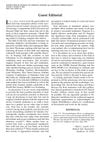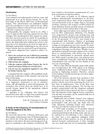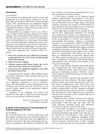 1 citations,
April 2018 in “Lasers in Surgery and Medicine”
1 citations,
April 2018 in “Lasers in Surgery and Medicine” New treatments and technologies in laser medicine show promise for improving skin conditions, fat reduction, cancer treatment, wound healing, and hair restoration.
 1 citations,
July 1988 in “JAMA”
1 citations,
July 1988 in “JAMA” Metronidazole can cause lung disease.
 1 citations,
January 1984 in “Pediatric Dermatology”
1 citations,
January 1984 in “Pediatric Dermatology” Upcoming pediatric dermatology events and submission guidelines were announced.
[object Object]  1 citations,
February 1976 in “JAMA”
1 citations,
February 1976 in “JAMA” Haloperidol effectively treated hemiballismus, but spontaneous improvement wasn't ruled out; rapid weight loss can cause hair loss with good regrowth chances.

The woman was diagnosed with lichen sclerosus, a rare skin condition, after initial misdiagnosis and ineffective treatments.

Dermatologists need better training on Black hair to improve care and outcomes.

An infant with a zinc deficiency skin disorder improved with zinc treatment.

Screening for iron levels in patients with hair loss may help find a genetic iron overload condition early.

Combining epinephrine with a steroid may help regrow hair in severe alopecia areata cases.

A girl with Crohn's disease developed hair loss due to her increased medication, a rare side effect seen in some children.
 December 2020 in “The Journal of Family Practice”
December 2020 in “The Journal of Family Practice” The boy's itchy scalp and hair loss were likely due to head lice treatment.
 May 2019 in “Australasian Journal of Dermatology”
May 2019 in “Australasian Journal of Dermatology” New insights in skin conditions show a complex link between certain moles and melanoma, improved hair loss treatments, and the need to identify different types of lupus.

The conclusion is that a more comprehensive and precise approach is needed for diagnosing PCOS to address its broader health risks.
 January 2015 in “Plastic and Reconstructive Surgery”
January 2015 in “Plastic and Reconstructive Surgery” The book is a valuable guide for hair restoration surgeons.
[object Object]  January 2015 in “International journal of reproduction, contraception, obstetrics and gynecology”
January 2015 in “International journal of reproduction, contraception, obstetrics and gynecology” Women with PCOS often have irregular periods, a higher chance of infertility and miscarriages, and may improve fertility with lifestyle changes and treatment.
 July 2013 in “Journal of Plastic Reconstructive and Aesthetic Surgery”
July 2013 in “Journal of Plastic Reconstructive and Aesthetic Surgery” The book is a detailed guide on aesthetic plastic surgery, essential for surgeons in the field.

Recent discoveries have improved our understanding of hair loss, but challenges in treatment and knowledge among specialists still exist.
 December 2011 in “Journal of The American Academy of Dermatology”
December 2011 in “Journal of The American Academy of Dermatology” The book is a detailed and useful guide for doctors learning about hair transplantation.
 January 2011 in “Journal of Cutaneous and Aesthetic Surgery”
January 2011 in “Journal of Cutaneous and Aesthetic Surgery” The Editor-in-Chief is proud of the journal's growth and improvements during his term and optimistic about its future.
 April 2008 in “Australasian journal of dermatology”
April 2008 in “Australasian journal of dermatology” The book gives a basic overview of mesotherapy and fat-dissolving injections but lacks detailed guidance and effectiveness comparisons for practitioners.
 December 2006 in “International Journal of Dermatology”
December 2006 in “International Journal of Dermatology” Two major dermatology conferences were held in 2006, focusing on skin immunity and various skin diseases.
 April 2006 in “Current Opinion in Endocrinology & Diabetes”
April 2006 in “Current Opinion in Endocrinology & Diabetes” Testosterone therapy can help improve sexual function, mood, and bone density in women with low androgen levels, but more research is needed on long-term safety.
 August 2005 in “British journal of dermatology/British journal of dermatology, Supplement”
August 2005 in “British journal of dermatology/British journal of dermatology, Supplement” Melatonin may help treat hair loss and needs more research.
 December 2001 in “Fertility and Sterility”
December 2001 in “Fertility and Sterility” The book provides a clear overview of PCOD and is recommended for medical trainees and clinicians, but may lack depth for advanced researchers.
 June 2001 in “International Journal of Cosmetic Surgery and Aesthetic Dermatology”
June 2001 in “International Journal of Cosmetic Surgery and Aesthetic Dermatology” The editorial concludes that the field of hair loss treatment has become more scientific and that effective treatments are important for self-esteem and job prospects.
 July 2000 in “Dermatologic Surgery”
July 2000 in “Dermatologic Surgery” Many skin products get contaminated with bacteria, especially if they're in jars or previously opened.
 July 2000 in “Dermatologic Surgery”
July 2000 in “Dermatologic Surgery” Dr. Yarborough denied endorsing Derma Genesis and was mistakenly represented due to his office manager's error; also, over 30% of tested skin products were contaminated with bacteria.
 May 1999 in “Dermatologic Surgery”
May 1999 in “Dermatologic Surgery” The cell culture medium "RPMI" might slightly improve hair graft survival, but not by a significant amount.
 May 1999 in “Dermatologic Surgery”
May 1999 in “Dermatologic Surgery” Using an ultrasonic liposuction machine with different cannula sizes and power settings does not change water temperature.
 May 1999 in “Dermatologic Surgery”
May 1999 in “Dermatologic Surgery” Dr. Zitelli emphasized that "Mohs surgery" should only be called that when one doctor does both the surgery and pathology.





























